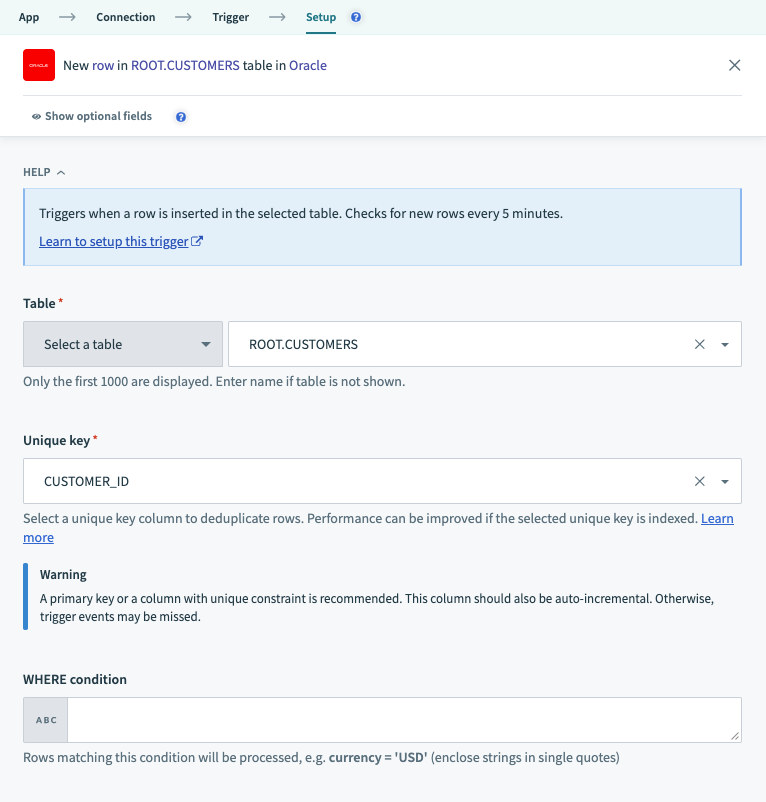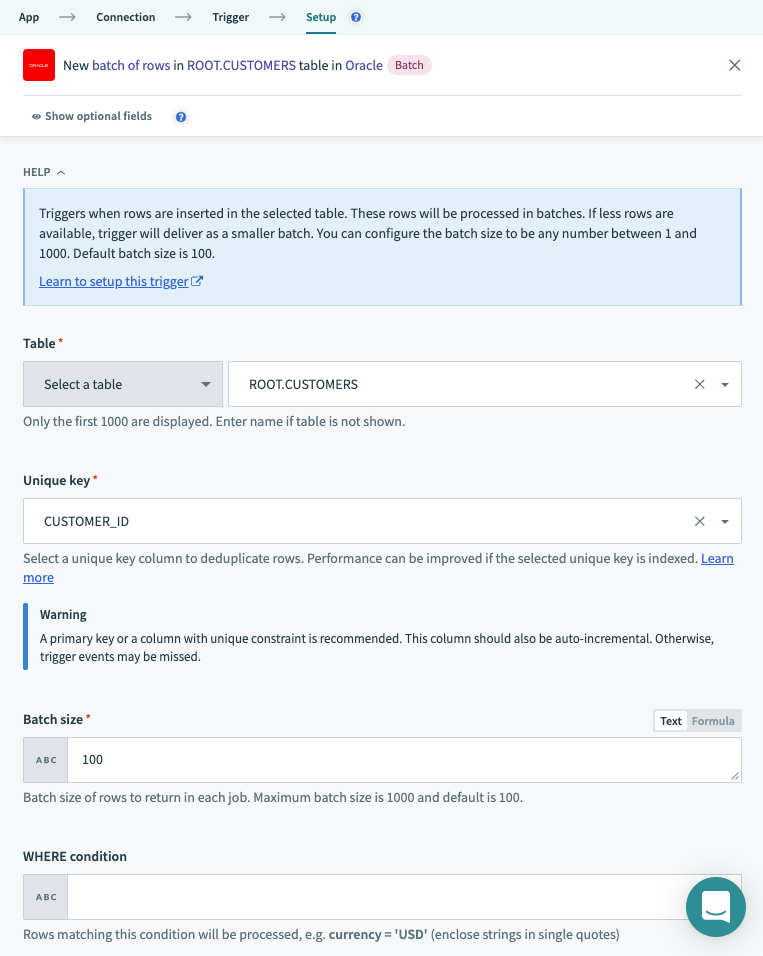# Oracle - New row triggers
# New row
This trigger picks up rows that are inserted in the selected table or view. Each row is processed as a separate job. It checks for new rows once every poll interval.
TRIGGER USAGE
This trigger fetches all matching rows from the table or view you select, including historical records. We recommend that you add a WHERE condition to limit the number of rows the trigger processes and reduce load on large tables.
 New row trigger
New row trigger
| Input field | Description |
|---|---|
| Table | Select the table/view from which you plan to process rows. |
| Unique key | Select a unique key column to uniquely identify rows. This list of columns is generated from the selected table/view. |
| WHERE condition |
Provide an optional WHERE condition to filter rows.
|
# New batch of rows
This trigger picks up rows that are inserted in the selected table or view. These rows are processed as a batch of rows for each job. This batch size can be configured in the trigger input. It checks for new rows once every poll interval.
TRIGGER USAGE
This trigger fetches all matching rows from the table or view you select, including historical records. We recommend that you add a WHERE condition to limit the number of rows the trigger processes and reduce load on large tables.
 New batch of rows trigger
New batch of rows trigger
| Input field | Description |
|---|---|
| Table | Select a table/view to process rows from. |
| Unique key | Select a unique key column to uniquely identify rows. This list of columns is generated from the selected table/view. |
| Batch size | Configure the batch size to process in each individual job for this recipe. |
| WHERE condition |
Provide an optional WHERE condition to filter rows.
|
# Input
# Table
The Table field is where you select the table/view from which you plan to process rows. You can either select a table from the pick list or toggle the input field to text mode and type the full table name.
# Unique key
Values from this selected column are used to deduplicate rows in the selected table. This ensures that the same row is not processed twice in the same recipe.
The values in the selected column should not be repeated in your table. Typically, this column is the primary key of the table (for example, ID). It should be incremental and sortable. This column can also be indexed for better performance.
Only columns that have primary key ('P') or unique ('U') constraints can be used. Run the following SQL query to find out which columns fulfill this requirement.
SELECT c.column_name
FROM all_indexes i, all_ind_columns c
WHERE
i.table_owner = 'TABLE_OWNER' AND
i.table_name = 'TABLE_NAME' AND
i.uniqueness = 'UNIQUE' AND
i.table_name = c.table_name AND
i.index_name = c.index_name
UNION
SELECT cc.column_name
FROM all_constraints con, all_cons_columns cc
WHERE
con.table_owner = 'TABLE_OWNER' AND
con.table_name = 'TABLE_NAME' AND
con.constraint_type in ('U', 'P') AND
con.table_name = cc.table_name AND
con.constraint_name = cc.constraint_name
# Batch size
This field determines the Batch size of rows to return in each job. This can be any number between 1 and the maximum batch size. Maximum batch size is 1000 and the default is 100.
For any poll, if there are less rows than the configured batch size, this trigger delivers all rows as a smaller batch.
# WHERE condition
The WHERE condition is used to filter rows based on one or more column values. For example:
status = 'closed' and priority > 3
Leave the WHERE field blank to process all rows from the selected table.
Complex WHERE conditions with subqueries can also be used. Refer to the WHERE condition documentation for more information.
Last updated: 1/19/2026, 4:31:14 PM